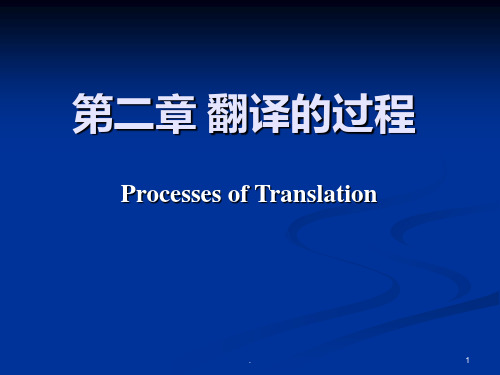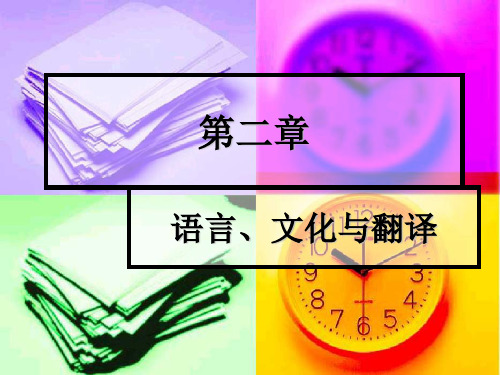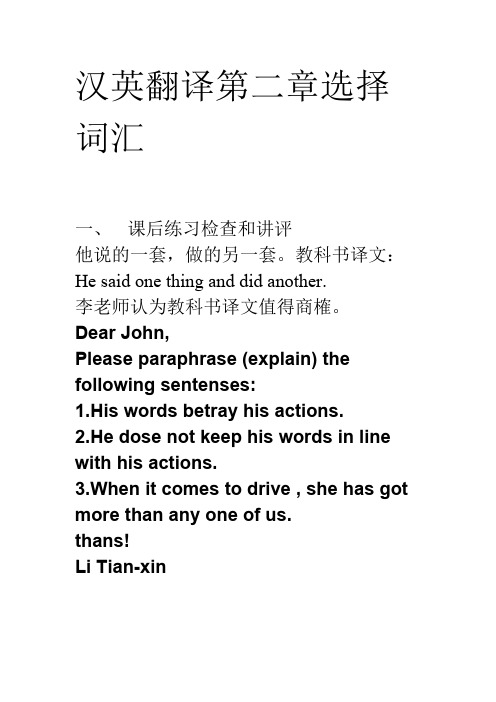翻译课件第二章
英汉笔译基础教程第2章 中国翻译史简介

70年代末的“名著重印”
❖外国文学研究的八年规划
▪ 1978年11月,为新时期我国的外国文学研究工作的全面 展开设计了最初的蓝图。
▪ 恢复“三套丛书”的出版工作
❖“名著重印”
▪ 1977年试探性地重印了5本久被禁绝的外国文学名著 ▪ 1978年重印累计达到37种 ▪ 根据朱生豪译本校订的《莎士比亚全集》,计11卷。
❖ 公元前11世纪,通过“多重翻译”而进行交流的记 载.
❖有文字记载的最早的笔译始于战国时期 ❖ 最早的翻译文字作品是西汉刘向在《说苑·善说》
中记载的一首包括越语原文和楚语译文的《越人 歌》。
中国翻译发展史三个阶段
❖根据我国翻译史上主要翻译对象的变化,结合人 类对翻译活动认识的发展以及翻译在各历史阶段 的社会中所占据的地位和影响,我们把中国翻译 发展史划分为三个不同的阶段:
LOGO
英汉笔译基础教程第2章 中国翻译史简介
第二章 我国翻译史简介
❖2.1 中国早期的翻译活动 ❖2.2 宗教翻译阶段 ❖2.3 文学翻译阶段 ❖2.4 非文学翻译阶段
2.1 中国早期的翻译活动
❖ 《周礼》中的“象胥”,就是四方译官之总称。 ❖ 《礼记·王制》提到“五方之民,言语不通”,为
了“达其志,通其欲”,各方都有专人,而“北 方曰译”。
起点。
《新青年》 的文学翻译
❖ 《新青年》倡导:
▪ 译介西方文化和文学作品,标志着新文化运动的开始, 也掀起了文学翻译的热潮。
❖时间:
▪ 从1915年9月到1926年7月停刊
❖成果:
▪ 译介小说47部(篇),戏剧15部,诗歌195首。 ▪ 除欧美现实主义作品以外,《新青年》还把注意力转向
英语课文第二章翻译

2. 优雅的⽼老去—改变你的情绪1. 有时候情绪似乎会成为我们享受美好⽣生活的⼀一种障碍。
⽆无论我们觉得悲伤、⽣生⽓气、或是!⽆无聊,情绪似乎在我们的所作所为中都扮演着重要的⾓角⾊色/起着很⼤大的作⽤用。
确实,很多⼈人认为情绪是产⽣生⾏行为的唯⼀一因素。
但是我们不能⽌止步于此,为何不问⼀一下是什么促成了某种情绪?情绪的产⽣生并⾮非是随机的/⽆无理头。
事实上情绪是你正遭遇事件的⽣生理反应。
换⾔言之,情绪和⾏行为的结果是由你周围事件⽽而引起的。
因⽽而,如果你真想改变你的感受,你就需要改变那些引发你情绪的环境。
2. 时不时的陷⼊入恐慌并⾮非不正常。
你可能啥事⼉儿都不想做,只是坐在电视机前,甚⾄至坐上!好⼏几个⼩小时,这只会让你的⼼心情更忧郁/糟糕。
如果你真的对改变你的⼼心情感兴趣,那你就需要起⾝身并且开始⾏行动。
⽐比如:散散步;看看你周围的世界;观察花草树⽊木;感受落在你脸上的阳光。
这也许是我们能提供给你的最重要/有⽤用的建议。
散步会让你⼼心情好些。
但如果不想散步,那⾄至少找⼀一些你感兴趣的活动。
去看场电影,去参观博物馆,和朋友共进午餐,或者,是的,去购物吧。
做那些事很简单⽽而⼜又愉快,并会使你的⼼心情变好些。
3. 如果你经常对⾝身边的每件事情渐渐缺乏兴趣的话,对改变你低落的情绪⽽而做些什么就尤!为重要了。
对你周围的事⼉儿缺乏兴趣有可能是⼤大量的碰巧在你⾝身边同时发⽣生的事情导致的结果。
⽐比如:在你退休后你可能会经历⼀一些事情。
如果你还没计划好退休(后做些什么),那你可能会发现不再有早晨早起的理由了。
你也许会经历不再属于⼀一个集体⽽而产⽣生的失落感。
再⽐比如,如果你还没计划好接受⽣生活中这样⼀一个戏剧性的变化,你会发现你⽆无法打发新的⽣生活。
结果,你会觉得郁闷。
像这样的不开⼼心的感觉是危险信号,它表明你需要改变⼀一下你所处的环境了。
因为你⽩白天很少有事情做,早上闹醒并且看到时间六点钟会使你不开⼼心吗?通过增加⾝身体的锻炼和智⼒力的锻炼以便你能够整个⽩白天忙于其中能解决这个问题。
英汉互译实用教程 (郭著章) 第二章 翻译过程及词义确定 本章内容

英汉互译实用教程(郭著章)第二章翻译过程及词义确定本章内容概述:翻译过程:1. 理解原文2. 译文表达3. 校核阶段翻译过程:理解原文⏹1. 理解语言现象a.词汇现象b.语法现象⏹2.理解逻辑关系⏹3.理解所涉及事物理解原文:理解语言现象译者必须上下有联系地理解原文的词汇含义、句法结构和惯用法等理解原文:理解语言现象a.词汇现象:根据上下文确定词义⏹Eg.1. Life is full of ups and downs.人生充满了欢乐与痛苦。
⏹He has seen the ups and downs in the history of ⏹the relations between the two countries.⏹他经历了两国关系史上的分分合合。
a.词汇现象:根据上下文确定词义Eg. 2. The wedding ,which Heyward still remembered with pride ,was attended by a who's who of Boston Society.赫华德仍然记得,参加婚礼的人中有波士顿的一位社会名流,这使他感到十分得意。
a.词汇现象:根据上下文确定词义Eg.3. There was no lady about him. He was what the woman would call a manly man. That was why they like him.他这人没有一点女人气。
他是女人们称之为男子汉的那种人。
这正是他们喜欢他的原因所在。
a.词汇现象:根据上下文确定词义4. My handwriting was so bad that after taking dictation, I couldn’t translate it.辨识、辨认a.词汇现象:根据词性确定词义Eg.5. On his way home he bought some apples at a fruit stand.摊位他回家时,在路上的水果摊上买了些苹果。
第二章-翻译的过程PPT课件

.
8
tediousness
Minority ethnic group
.
9
2.2 流畅表达(Fluency in ExpressiБайду номын сангаасg)
表达是理解后能否保证成功的又一重要关 键步骤,是理解的深化和表达,译者要恰 当好处的再现原文的内容。能直译时就直 译,不能直译在考虑意译。
例1: Medicinal Herbs help cough.
2) Do you have anything to declare? (in Customs)
3) They declared themselves against the plan.
.
4
2.1.1 正确理解句子
例1:The woman who said she saw the murderer wears glasses.
科学家证实了青鱼生存所需温度。
.
13
2.2.3 句子的表达
例3. Gauss published some 155 titles during his lifetimes, and he left behind a large quantity of unpublished work.
高斯一生发表过约155篇论文,而且还留下 了大量未发表过的作品。
当您意识到您的杰出事业是如此广泛的受 到尊敬与欣赏,您就会为自己增添力量。
.
7
2.1.2 正确理解段落与篇章
例1:
It is hardly possible here to summarize his ideas. Suffice it to point out /say that they constitute a dependable response to the demands of a crisis which steadily increases the feelings of helplessness and hopelessness of the individual by asserting his primacy and supremacy and open up a perspective of restoring sanity and decency in public life.
大学实用翻译教程(英汉双向)第二章 语言、文化与翻译

三、英汉句子对比
1、主谓句与主题句
英语是主语显著(subjectprominent)的语言,英语句子中, 主谓结构必不可少,地位突出, 成为英语句子中的普遍形式。表 达复杂思想时,往往开门见山, 然后借助英语特有词汇关系代词 进行空间搭架,把各个子句有机 地结合起来,构成一串葡萄似的 句子。
相反,汉语是主题显著(topicprominent)的语言,汉语句子可 由几个短句组成,它们之间只有 意义上的联系,无需形式上的粘 连。
……不要有了新亲.把旧亲忘个 干净!这种没良心的人我见得多 了。
…Once you have new relatives, don't forget the old ones.I have
seen too many such ungrateful people.
2、 英语句子中,名词介词占优势, 而汉语中则是动词占优势
3、英汉句子重心比较
在复合句子中,英语的主句为主 要部分,一般放在句首,即重心 在前。而汉语则一般按照逻辑和 时间顺序,将主要部分放在句尾, 形成后重心。
另外,由于英语句子结构紧凑, 往往句子重心单一,焦点集中, 而汉语句子则焦点分散
第三节 中西文化的差异
语言是文化的重要组成部分,也 是文化赖以传播的物质表达形式。 语言和文化共生、共存,是文化 本质的部分反映。语言和文化密 不可分,文化的差异可以通过语 言反映出来,为我们提供对比研 究的具体依据。
由于英语句子中主要采用主谓结构, 谓语动词是句子的核心,谓语动词又 受形态变化的约束,这样表达时就要 借用大量名词,而名词与名词之间要 靠介词来连接,因而英语中名词与介 词占优势。
在汉语中,由于动词没有什么形态变 化,使用方便,而且注重动态描写, 所以汉语动词使用频繁。在表达复杂 思想时,往往借助动词,按时间顺序、 逻辑顺序,层层铺开,句子结构有如 竹节一般。并且有很多特殊的复合句, 由整句与零句混合交错,组成了流水 句。
第二章汉译英词语翻译

Reed Flute Cave is the most magnificent of all in Guilin.
第11页,共61页。
❖ 有时,为了保持原文符号意义的完整,译者可采用直译加 注的方法。
❖ 对外开放取得新进展。1990年共批准“三资”企业99家 ,全省“三资”企业已达284家。
(
In china’s more remote and backward rural areas, corru)pt
practices exist in the form of forced marriages……
第17页,共61页。
✓ 有目共赏—上海牌电视机
直译: You can enjoy it if you have eyes (
第12页,共61页。
❖ 东方时空—Oriental Time and Space ❖ 人与自然—People and Nature ❖ 音乐桥—Music Bridge ❖ 与你同行—Going Along with You ❖ 环球45分钟—Around the Globe in 45
Minutes
❖ 《戏剧人生》 —Dramatic Life
第15页,共61页。
❖ “小天鹅”洗衣机— “Little Swan” Washer ❖ “三鹅牌”图钉— “Three Geese” Drawing Pins ❖ “活力”奶—Vitality Milk ❖ “钻石”牌手表— “Diamond” Brand Wrist Watches
姑苏城外寒山寺,夜半钟声到客船。
Cold-Hill Monastery
Han Shan Monastery
第22页,共61页。
汉英翻译第二章选择词汇资料

汉英翻译第二章选择词汇一、课后练习检查和讲评他说的一套,做的另一套。
教科书译文:He said one thing and did another.李老师认为教科书译文值得商榷。
Dear John,Please paraphrase (explain) the following sentenses:1.His words betray his actions.2.He dose not keep his words in line with his actions.3.When it comes to drive , she has got more than any one of us.thans!Li Tian-xinBoth 1. and 2. have the same meaning, however, the first (His words betray his actions.) is the more common way to express the concept.What this means is that what you say about a given subject iscontradictory to what you do. As an example ... a boy tells a girl thathe loves her, he can't live without her and various other romantic things. Then this same boy is seen with other girls in an intimate setting - maybe eating dinner, maybe going to a movie, and so on. He says that there is only one girl for him but his actionsprove him a liar - his words betray his actions.3. The word 'drive' here means desire, commitment and faithfulness to start and finish a project of any kind. Itcould be learning to swim, graduating from college (a 4-year commitment takes a lot of 'drive' to complete), even studying for an exam requires'drive' from the students who really want to succeed and achieve good things.A paraphrase of 3. then is: She has more faith, commitment and action in every aspect of her life than any of us.John干劲的英文音标:[ gànjìn ]drive; vigour; enthusiasm: 有头脑、干劲和首创精神的青年young men with brains, drive and initiative; 干劲十足be full of vigour; 冲天干劲boundless energy1.We shall want a real Henry Fordeffort .我们需要有一种真正亨利福特的干劲。
翻译 第二章

回目录
主语的翻译
• 例1:The hypothesis of natural selection may not be a complete explanation, but it led to a greater thing than itself—an acceptance of the theory of organic evolution, which the years have but confirmed. • 译文:自然选择的假设也许还不是一个完整的解释,但是,它引导人 们接受了一个比它本身更重要的东西——生物进化论,这一理论随着 岁月的流逝得到了全然证实。 • 例2: The sea receives you, envelops you in her warmth, soothes the urban tiredness out of you. She lets you gambol with her children, the waves, and even sends them to play with you. They push you gently and pull you back, sprinkle you till your very being exults in the exhilaration of being alive and one with nature. • 译文:大海接待了你,她的温暖拥抱着你,都市生活的疲乏在此一扫 而光。大海让你同她的孩子们——小海浪们一起嬉戏,甚至把他们送 到你面前。孩子们友好地把你拖下去,又送上来,使你浑身喷洒着水, 感到心旷神怡,与自然融为一体。
主语的翻译
3.主语 3.主语It 主语 (1) It 做主语 It在英语语法中被称做无人称代词,代表时间、天气、距 在英语语法中被称做无人称代词 代表时间、天气、 在英语语法中被称做无人称代词, 离及度量,无具体词义,在句子中充当主语, 离及度量,无具体词义,在句子中充当主语,是万万少不 得的。 得的。如: 例1:It was not until 19 century that man has realized that brain is the center of thought.(强调句) (强调句) 译文:直到19世纪, 19世纪 译文:直到19世纪,人们才意识到大脑是思维活动的中 心。
- 1、下载文档前请自行甄别文档内容的完整性,平台不提供额外的编辑、内容补充、找答案等附加服务。
- 2、"仅部分预览"的文档,不可在线预览部分如存在完整性等问题,可反馈申请退款(可完整预览的文档不适用该条件!)。
- 3、如文档侵犯您的权益,请联系客服反馈,我们会尽快为您处理(人工客服工作时间:9:00-18:30)。
Example Analysis
Look at these examples. How can we translate them into idiomatic English by paying attention to the differences between Chinese and English? 1) 他每天风里来,雨里去,一年到头忙忙碌 他每天风里来,雨里去, 碌。 2) 面对敌人的刺刀,他脸不改色心不跳。 面对敌人的刺刀,他脸不改色心不跳。
1) 他每天风里来,雨里去,一年到头忙忙碌 碌。 他每天风里来,雨里去, A: He is busy all the year round coming in the wind and going in the rain. B: Braving the weather (Going through wind and rain) , he is busy all the year round. 2) (面对敌人的刺刀 ,他脸不改色心不跳。 面对敌人的刺刀), 面对敌人的刺刀 他脸不改色心不跳。 A: The color of his face does not change and his heart does not beat. B: He doesn’t show the slightest panic / fear and his heart does not even bear any faster.
1)
2). 孟子曰:“鱼, 我所欲也;熊掌,亦我所欲也。 二者不可兼得,舍鱼而取熊掌者也。生, 我 所欲也;义, 我所欲也。二者不可兼得,舍 生而取义者也。” Mencius said, “I like fish and I also like the bear’s paws. If I cannot have the two together, I will let the fish go and take the bear’s paws. In a similar way, I like life, and I also like righteousness. If I cannot have the two together, I will give up my life to preserve righteousness.”
2) 地面潮湿,一定下过雨了。 地面潮湿,一定下过雨了。 It must have rained, since the ground is wet. wet. 3) 他老是见异思迁。 他老是见异思迁。 He is always changing his mind the new. moment he sees something new.
这种人老是被动,在紧要关头老是止步不前, 老是需要别人在他的背上猛击一掌才肯向前跨 进一步。 A: Such people are always passive: They often stand still at the critical moment, and always need someone to shove them on the back to make them move a step forward. B: Such people are always passive in that at the critical moment they stand still and have to be given a hard shove on the back before they take a step forward.
今天周末。 今天周末。(Today is Sunday.) ) 这几天越来越暖和了。 这几天越来越暖和了。(It’s getting warmer and warmer.) ) 会上讲了一些很重要的问题。 会上讲了一些很重要的问题。(Some very important issues were talked about in the meeting.) )Fra bibliotekxercises:
1) 2) 3) 4) 5) 6) 他说得太快,我们不能理解他的意思。 地面潮湿,一定下过雨了。 他老是见异思迁。 道路是曲折的,前途是光明的。 留得青山在,不怕没柴烧。 知无不言,言无不尽。
1)
他说得太快,我们不能理解他的意思。 他说得太快,我们不能理解他的意思。 He spoke so rapidly that we could not clearly understand him. him.
Hypotaxis (形合)and Parataxis(意合) 形合) 形合 (意合) English – More Hypotactic; Chinese –More Paratactic
2. Example Analysis:
1) 这种人老是被动,在紧要关头老是止步不 前,老是需要别人在他的背上猛击一掌才 肯向前跨进一步。 2) 孟子曰:“鱼, 我所欲也;熊掌,亦我所 欲也。二者不可兼得,舍鱼而取熊掌者也。 生, 我所欲也;义, 我所欲也。二者不可 兼得,舍生而取义者也。”
4) 道路是曲折的,前途是光明的。 While the road is tortuous, the future is bright. 5) 留得青山在,不怕没柴烧。 As long as the green mountain are there, one should not worry about firewood. 6) 知无不言,言无不尽。 Tell all that you know and tell it without reserve.
